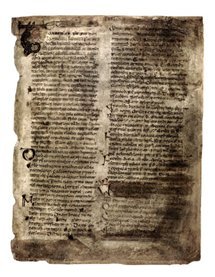Sources of the Táin Bó Cuailnge
Early Irish manuscripts are the oldest remaining extant literary source material in Europe, opening a fascinating window to the Medieval society in which they were written down, and the older tales and oral traditions which they record for us to enjoy today.
The Táin Bó Cuailnge, the ‘Cattle Raid of Cooley’, (often just called "the Táin" - pronounced - TAWn, though there are actually a number of different Táin stories) lies at the heart of Ireland’s epic storytelling legacy.
 Leabhair na hUidre, pic from the RIA This is a tale set around the 1st Century CE, in the middle of the Iron Age – told and re-told through the ages. The story survives in a couple of different versions, called ‘recensions’; there are 3 of these remaining to us today.
Leabhair na hUidre, pic from the RIA This is a tale set around the 1st Century CE, in the middle of the Iron Age – told and re-told through the ages. The story survives in a couple of different versions, called ‘recensions’; there are 3 of these remaining to us today.
There is a partial text in Leabhair na hUidre, ‘the Book of the Dun Cow’, which is dated to the late 1000’s CE, and the rest of this version is found in the ‘Yellow Book of Lecan’, dated to the late 1300’s. Together they make a complete Táin story, copied over the centuries from book to book. Some of the prose language is thought to be as old as the 700’s CE, and the poetic verses even older.
The second version is found in the ‘Book of Leinster’, dated to around the 1100’s CE, when a scribe tried to bring together a complete story, and updated the language and style to match his own time. There’s a later third recension too, scattered in bits and pieces through other manuscripts.
The Book of Leinster scribe may have thought the tale worth re-telling, or perhaps he was reluctant and had been ordered to just get on with it, as there are elements of the Táin that didn’t sit well with him at all. His note in the margins, written in formal Latin script, tells its own tale:
Please Leave Your Comment Below!
The Táin Bó Cuailnge, the ‘Cattle Raid of Cooley’, (often just called "the Táin" - pronounced - TAWn, though there are actually a number of different Táin stories) lies at the heart of Ireland’s epic storytelling legacy.
 Leabhair na hUidre, pic from the RIA This is a tale set around the 1st Century CE, in the middle of the Iron Age – told and re-told through the ages. The story survives in a couple of different versions, called ‘recensions’; there are 3 of these remaining to us today.
Leabhair na hUidre, pic from the RIA This is a tale set around the 1st Century CE, in the middle of the Iron Age – told and re-told through the ages. The story survives in a couple of different versions, called ‘recensions’; there are 3 of these remaining to us today.There is a partial text in Leabhair na hUidre, ‘the Book of the Dun Cow’, which is dated to the late 1000’s CE, and the rest of this version is found in the ‘Yellow Book of Lecan’, dated to the late 1300’s. Together they make a complete Táin story, copied over the centuries from book to book. Some of the prose language is thought to be as old as the 700’s CE, and the poetic verses even older.
The second version is found in the ‘Book of Leinster’, dated to around the 1100’s CE, when a scribe tried to bring together a complete story, and updated the language and style to match his own time. There’s a later third recension too, scattered in bits and pieces through other manuscripts.
The Book of Leinster scribe may have thought the tale worth re-telling, or perhaps he was reluctant and had been ordered to just get on with it, as there are elements of the Táin that didn’t sit well with him at all. His note in the margins, written in formal Latin script, tells its own tale:
But I who have written this story, or rather this fable, give no credence to the various incidents related in it. For some things in it are the deceptions of demons, other poetic figments; some are probable, others improbable; while still others are intended for the delectation of foolish men.Read my Review of the Best Táin Translation
Please Leave Your Comment Below!
Published on July 21, 2015 16:51
No comments have been added yet.



